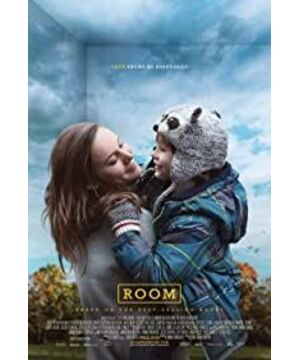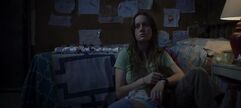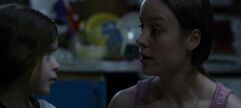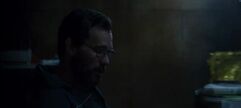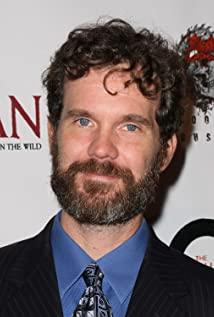However, this movie chose a difficult path and simply cut away the process of tragedy formation. The tragedy factor is only used as the background of the story, and only a few lines are used to describe it. It focuses on telling how the mother and son escaped the room and the imprisoned body. The room where the mind is imprisoned uses a two-stage positive-order narrative structure that is prone to maladjustment to advance the plot, without flashbacks and no interspersed content. However, it was very successful with the control of the rhythm and the unique perspective of children.
The uniqueness is shown at the beginning of the film. Close-ups of several broken scenes in the room, with a warm and soothing soundtrack, and a poetic monologue of a childish voice. The camera shows the mother and daughter on the bed, just like a healing family movie. Look like. It wasn't until the childish background monologue revealed to me that Jack-this obvious male name, was something wrong. "Ma, I am five." Jack opened his eyes and woke up the mother beside him. With a light sigh, she immediately smiled and picked Jack up, "You are such a big boy now." Mother and daughter turned out to be mother and child. If the audience were the same as me, if they had not been spoiled to any degree in advance, they would have been very interested in the first two minutes, wondering what kind of story this was.
The screenwriter cleverly reveals some background information from time to time through Jack's monologue and mother-child dialogue: Sunday Treat, Old Nick, Aliens, etc., while showing Jack's pure and white character, it cleverly mobilizes the audience's curiosity. Wanting to be friends with a mouse and wondering whether he will enter the TV and other bridge segments when dreaming all hinted at the fact that Jack had never left the room. (In Freud's "Analysis of Dreams", it is believed that the scenes in dreams are all derived from materials seen in life, that is, Jack's dreams are only about the content in the room and the TV.) Put on the tone of warmth The color of suspense.
It is not a new practice to gradually reveal the tragedy behind it to the audience in the form of suspense. Movies such as "Source Code" and "Memories" use this method to keep the audience focused throughout the process. The film uses a warm soundtrack and mother-child interaction to slow down the rhythm. The audience can only perceive the tragedy behind the airtight environment, mother's numb expression and occasional helpless sighs. Even after his mother told Jack the truth, the audience's attention was drawn to escape, and the director seemed to be deliberately suppressing the tragedy.
The 17-year-old Huaji was imprisoned as a sex slave. It is not difficult to imagine that in the first two years of Jack's birth, her mother's entire life was a confined room and TV, as in Jack's monologue at the beginning of the film: Once upon a time, before I came, you cried and cried, and watched TV all day, until you were a zombie. The hope of living, she doesn't care that Jack's father is a pervert, in her heart Jack belongs to her.
Under Jack's influence, time began to slowly work, gradually numbing her crying heart, and ventingly shouted at the skylight every day, until she saw the opportunity to escape.
So my mother started telling the truth to Jack, and wanted to use Jack's help to return to the home where she had been thinking about it day and night for seven years. But on the first day in kindergarten, the scared children don’t want to leave their warm home and go to a strange school. What Jack wants to leave is his whole world. Without the company of his mother, how can he not be afraid?
"Maybe next year when I am six." I
believe that everyone sees Jack's red face and hears the phrase I HATE YOU, they will feel the tragedy element's first attack after a long period of time. It is fierce and precise. . On the one hand, I feel that my mother is very selfish, but at the same time I can only accept this kind of practice with empathy.
Out of love for his mother, Jack finally obediently took his mother's bad tooth to "execute the task". At this time, the camera showed Jack wrapped in a blanket a lot of close-up eyes, and at the same time switched back and forth with Jack's mother in Jack's perspective, perfectly showing Jack's fear and mother's worry.
At the turning point of the two paragraphs, the gradually rising soundtrack hung the audience's heart to the highest point. A large number of close-ups and the first perspective switch fully demonstrated Jack's shock and fear when he saw the new world for the first time. The slow motion afterwards is even more worrying. Jack, who curled up after being saved and missed his mother knocking on the police car, was also very distressing. He finally threw himself in his mother's arms and ended the warm and suspenseful first half of the film with a meaningful dialogue.
"But bed, in room."
In addition to the suspenseful tone, the details in the first half of the film are also very meticulous. The bedtime reading for Jack by his mother is "Count of Monte Cristo"-Dumas's revenge theme work, suggesting her There was a heart eager to escape under the calm and numb expression. The clever use of words, such as not enough room when he refused to raise a dog, was changed to not enough space (Room is a special meaning in Jack's heart) and Un-lying (Telling the truth is obviously super-class for Jack with a simple world view), shouting After fruitless, "I guess they STILL can't hear us" also showed that she had tried to ask for help many times.
The same is a segmented structure. The end of the first half of "The Lost Lover" pushes the suspense to the highest point, and then through the interspersed narration and perspective switching in the second half, the rhythm is controlled to the point of perfection, giving the audience a hearty thrill. The unique narrative structure of the script puts the second half of the film in a very dangerous situation. The mother and son have been rescued, and the basic suspense of maintaining the advancement of the first half of the story disappears, like the end of a strong crossbow. Therefore, whether the second half and the first half can be coordinated and highlight the theme has become the key to determining the success of the film.
The second half began in a clean, spacious and bright hospital ward that was completely different from Room. Jack got out of bed and carefully felt this new room and new world. Then he was discharged from the hospital with a mask and a hat, and went to a new home with my grandparents and began to adapt to this new world. Jack needs to face the problem of smoothly passing this critical plastic period.
But in the heart of her mother who has been paralyzed by time and space for seven years, she has lost seven years of youth. The past life has long been a dysfunctional person. Her parents divorced and lost all contact with friends. Her past was destroyed by a tragedy. Clean and clean. When trapped in the room, she didn't need to face these problems, but she escaped from the room where the body was imprisoned, only to find that her heart had been locked in the dark for a long time. Some wounds can not be healed just with time.
At this time, the psychological state of the mother and son, under the effect of the suppressed tragedy in the first half, began to become a new driving force to maintain the development of the plot.
Nietzsche said in his autobiography: "Whatever does not kill them makes them stronger." In
The Dark Knight, the clown said: "I believe... whatever doesn't kill You simply makes you...stranger" (I think something that can't kill you will only make you more bizarre)
The statement in "House of Cards" is even more dialectical: "There are two kinds of pain.--The sort of pain that makes you strong ... or useless pain ... the sort of pain that's only suffering. "( pain are two, one makes you stronger a nothing except make you suffer with him)
real theme of the movie is in the With the support and help of loved ones, this kind of torturous and weird tragedy can also make people stronger. After experiencing extreme negative energy destruction, they can also use a positive energy mentality to make people live a wonderful life.
Although the release of the tragedy factor in the second half gave new impetus to the development of the plot, the theme gradually emerged. The movie is like an off-string energy-storing arrow. When the effect of inertia reaches the final moment, the energy absorbed by the flight before ejecting from the inside will continue to fly. If the second half cannot be in harmony with the first half, then this arrow will probably be due to The structure is not strong enough and breaks directly.
As the bearer of the tragedy, the change of her mentality is an important part of the theme. Her love for Jack is beyond doubt, but she gradually alienates her son and falls into a psychological state of self-destruction and even wanting to end her life.
"Ma was in a hurry to go boing up to heaven, but she forgot me. Dumbo Ma." (Mom was in a hurry to go boing up to heaven, but she forgot me. Dumbo Ma." He and Jack came to this day by mutual support, so Aliens threw her back down, and broke her.
Through Jack’s perspective and monologue, the audience can see that in his eyes, only his mother and himself, no matter if it is a small room Still a colorful world, there is no indelible ink on his mind like a white paper. No matter how desperate the surrounding environment is in the eyes of mother, he loses his temper, plays and feeds like a normal child; no matter what; In order to escape his mother's arrogance and unreasonable demands, he just vented and yelled "I hate you!" and obediently did so. His joy, anger, sorrow, and joy were all because of his mother. After knowing that Old Nick was not treating her badly, he took apart his favorite toy. Seeing that she was in a difficult period, he was willing to cut off his source of strength—the hair for her. This innocent and unconditional love is in stark contrast with the mother who is gradually alienated by the tragedy. It is this kind of consistent love that completely rescued Mom from the tragedy.
"I'm not a good enough Ma."
"But you're Ma."
The child's perspective that runs through the film becomes the steel fiber that maintains the two stable structures, and in conjunction with the tragedy elements, it hits the target's bullseye. This form of expression is similar to "Forrest Gump". Forrest Gump's unchanging qualities such as kindness, integrity, and trustworthiness have become the main thread that ties up the social evolution of the United States for decades and the process of Jenny's fall. The difference is that A-Gump was very helpless about Jenny's degeneration. The characteristics of capitalism at that time caused people like Jenny to wander at the bottom. The main purpose of using the form of expression based on Forrest's perspective is to put a coat of warmth and inspiration on the tragedy and irony elements; while the mother and child in "The Room" are inseparable, Jack can influence and change his mother through himself. As mentioned earlier, the ingenious script structure also greatly weakens the influence of the nature of the tragedy factor on the form of expression. The tragedy element only plays a basic role in promoting the plot in the second half. The main theme of the whole film is still warm, and the theme is positive. As for the warmth in my heart after watching the film.
"I love you, Grandma."
Unfortunately, due to the trend of the second half of the plot, the camera is limited by Jack’s perspective, and the heroine is slightly less portrayed, resulting in a lack of completeness in the performance. This is also a flaw in the
end of the film . The mother and son returned to the Room, whose life was on the right track. For Jack, it was just a visit after moving, and for Mom, it was an opportunity to face the tragedy directly after the paralysis.
In some traumas, time can only act as anesthesia, and the efficacy of the medicine will always pass. The people around you who love you help you open the door of the room and let the sun shine in. They are the real antidote.
"It can't really be room if door's open." After
giving potted plants, wardrobe, sink, and skylight one by one, Jack said to his mother: "Ma, say bye-bye to Room." and walked out of the room.
Mom also said, Bye-bye, Room in a voice that the audience can't hear but can see the content from the clear mouth. Opening the door in her heart, she turned and left with her son.
"If you don't mind, it doesn't matter."
PS: A friend found out that Jack’s soundtrack when he escaped was also The Mighty Rio Grande in "Penalty Kick." By the band This Will Destroy You.
PPS: It's the first time to write a film review. I am so talented and shallow. I am grateful to all my friends who gave me unconditional support and valuable opinions.
View more about Room reviews


